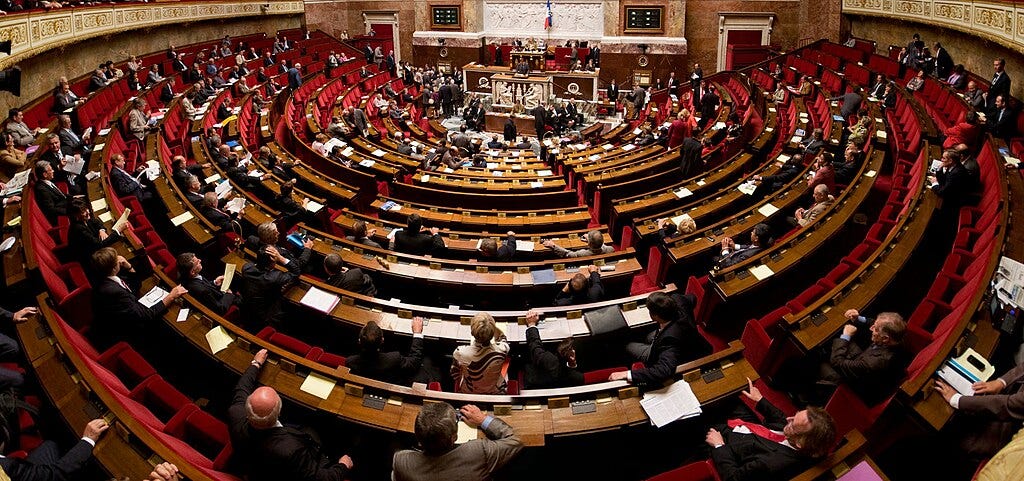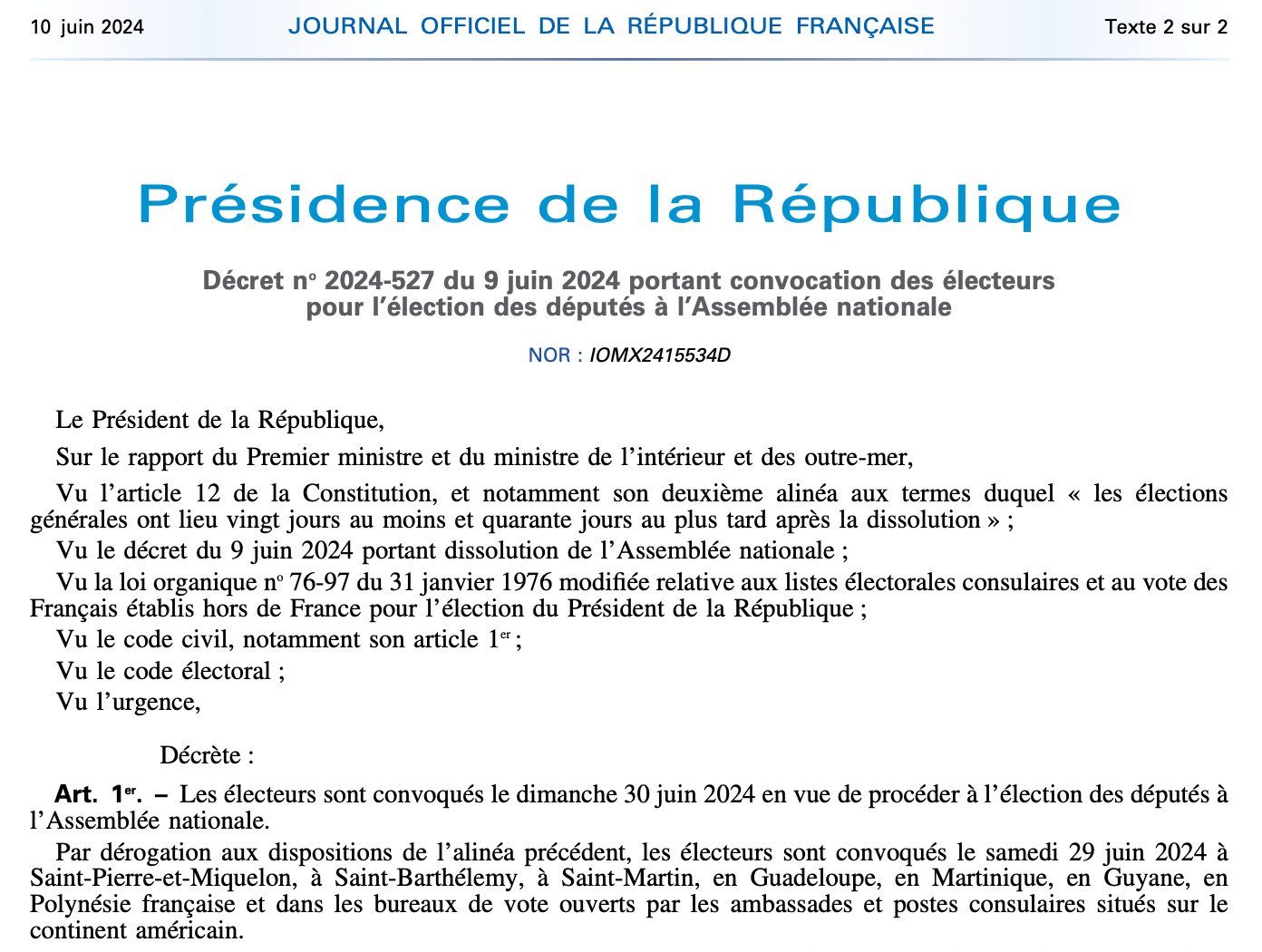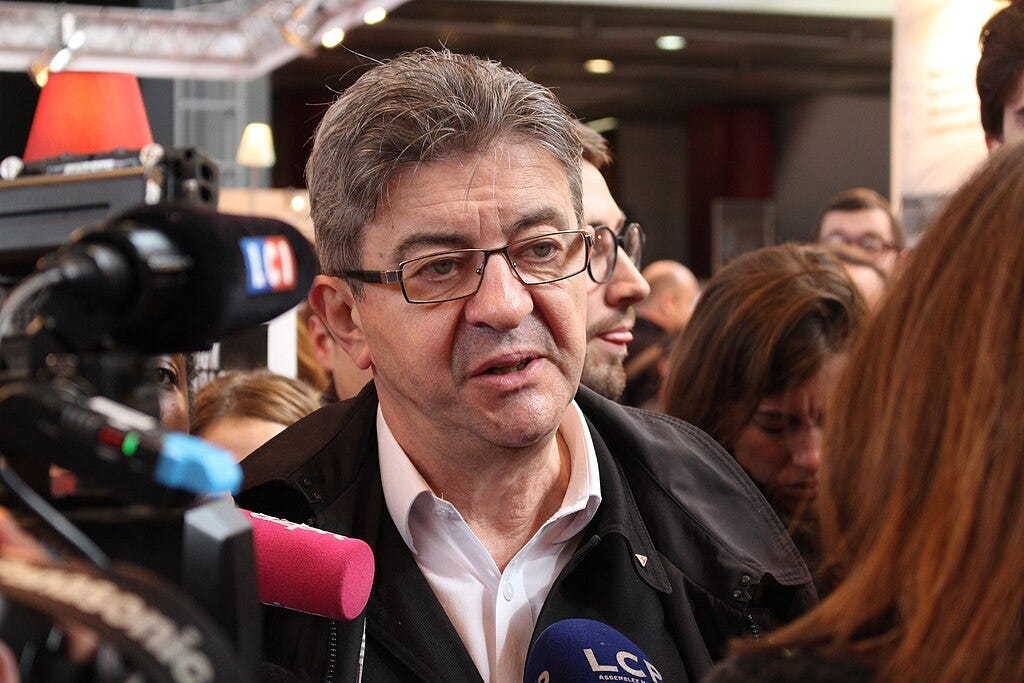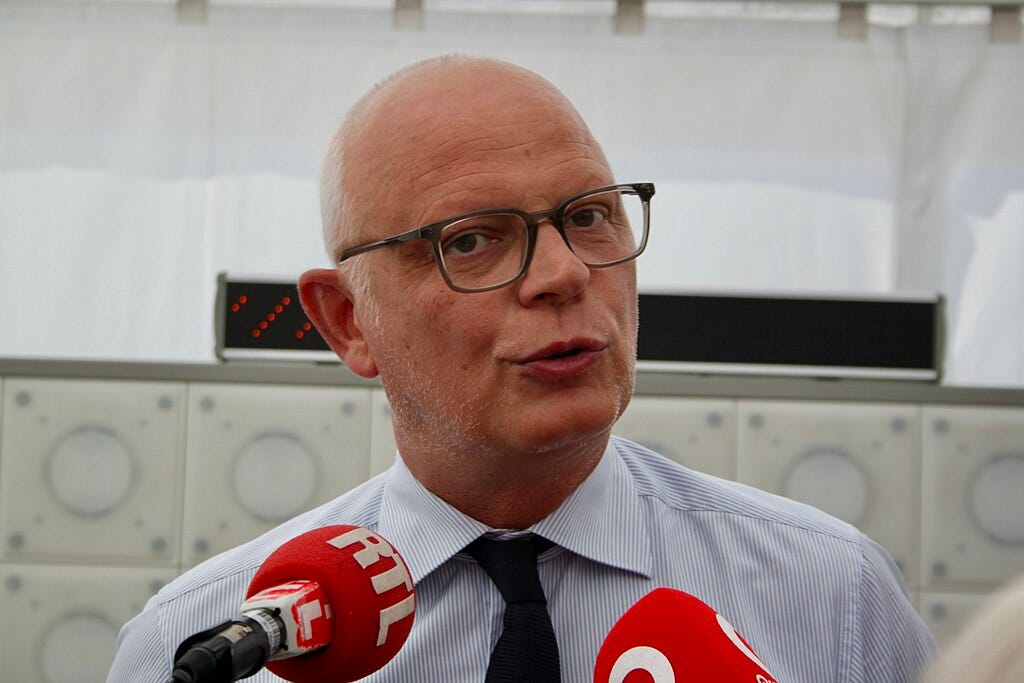“Will there be a re-election at the European level?” This question, posed by a resident of Gennevilliers, a communist bastion in the northern Paris suburbs, captured the disarray triggered by President Emmanuel Macron’s shocking decision to dissolve the National Assembly on June 9. After months of being courted by candidates, political parties and elected officials — even the prime minister and president, who weren’t on the ballot — during the European elections, French voters are now faced with a lightning-fast three-week campaign to decide the composition of the lower house of Parliament for the next five years. (Or at least the next year — Article 12 of the Constitution of the Fifth Republic prevents the president from dissolving it again for at least that long!)

The speed with which French political actors have reorganized themselves following the Assembly’s dissolution has been dizzying, and impressive. Over the course of just 20 days, political parties are tasked with brokering alliances and detailing their platforms; candidates with registering their campaigns, preparing their posters and literature, and persuading voters; and citizens with informing themselves of the political menu and making their selection. Did I mention that summer vacation and the Olympics are around the corner? Read on for the latest developments ahead of Sunday’s vote.
Two rounds, winner-takes-all
Elections for the National Assembly (known as les élections législatives or just les législatives) work very differently from the European elections held 15 days ago. Rather than being decided by a single-round vote with seats allocated proportionally across a nationwide constituency, the legislative elections are held in two rounds, with seats allocated through a winner-takes-all system in 577 constituencies. In each constituency, candidates from different parties stand for election; if any of them wins more than 50% of the vote, they are automatically elected to the Assembly and no second round (or runoff) is held. If no candidate wins a majority in the first round, then a runoff between the top two vote-getters (plus any other candidates receiving the support of at least 12.5% of registered voters in the constituency) is held one week later to determine the winner.

This two-round, winner-takes-all system has two main implications to keep in mind. First, the ultimate allocation of seats will disproportionately favor the dominant parties or alliances. For example, if a party wins 20% of the nationwide vote (suggesting that 20% of voters favor that party) but fails to win a plurality of the vote in any one constituency, it will obtain no seats in the Assembly. On the other hand, if a party wins 51% of the nationwide vote (suggesting that only a slight majority of voters favor that party), it could theoretically win every seat in the Assembly, if it wins a plurality in every constituency. This incentivizes smaller parties to form alliances, especially if they don’t have a strong territorial anchoring, meaning they don’t enjoy particularly strong support in specific constituencies where they can win a majority of votes.
Second, this system encourages tactical voting, especially in the second round. A voter who chooses a leftwing candidate in the first round may choose a center-right candidate in the runoff if the latter has a better chance of defeating the far-right candidate, even if their preferred candidate makes it to the runoff. Weaker candidates may even voluntarily withdraw from the runoff to clarify this choice for voters. Such tactical voting is especially salient in France, where the moderate parties have historically formed a “republican front” to block the far right from accessing power. Given the deal-making and tactical voting involved, it is also more difficult for pollsters to project how seats will ultimately be allocated in the Assembly before the first round has been conducted.
Realignment left…
The French left has languished, far removed from power, since 2017, when Macron denied President François Hollande a second term. The Socialist Party, traditionally the dominant center-left formation, has seen its fortunes in particular plummet, reaching a nadir in the 2022 presidential election, when Paris Mayor Anne Hidalgo failed to win even 2% of the vote. The leftwing La France Insoumise (LFI) has emerged as the most prominent leftist party in the Macron era, with the blustery Jean-Luc Mélenchon finishing just shy of the runoff in the 2022 race. Before the legislative elections that year, the four principal parties of the left formed a shaky coalition called the Nupes to augment their influence in the Assembly, but the socialists suspended their participation over LFI’s approach to the Israel-Gaza conflict. In the European elections, the Nupes’ constituent parties (socialists, LFI, communists and ecologists) ran separately.

And so it was as if by magic that in the hours and days following the Assembly’s dissolution the left began to coalesce into a new alliance: the Nouveau Front Populaire (NFP), or New Popular Front. Shortly after Macron’s announcement, LFI member François Ruffin called for unity on the left during an interview with BFMTV, evoking the Popular Front of the 1930s as a model. Popular demonstrations added momentum to this call, and party leaders began to hammer out a deal, in terms of both the alliance’s shared platform and how the 577 constituencies would be divvied up among the four parties. By Thursday, June 13, a final agreement was announced, with LFI receiving 229 constituencies, socialists 175, ecologists 92 and communists 50 — reflecting the renewed strength of the socialists thanks to the third-place finish of Raphael Glucksmann’s list in the European elections. In the end, it took just four days for the dissolution to bring together the left.
Infighting continues, however. Some socialists are uncomfortable allying with LFI, which has been accused of antisemitism since it has failed to call Hamas a terrorist organization, instead accusing it of “war crimes.” Notably, former socialist Prime Minister Bernard Cazeneuve wrote on X, “The coming together of the governing left cannot be done with LFI.” Most have proven more pragmatic, though. Hollande (yes, the former president!) is running for a seat in Tulle under the NFP banner, and former Justice Minister Christiane Taubira wrote on X:
None of this [infighting] is excusable or banal. But none of this rises to the level of peril [to the alliance], either. … The agreement that founds the New Popular Front is clear in its principles, bold and just in its program, and responsible.
There is also uncertainty about who would become prime minister if the NFP were to emerge from the elections as the most powerful group in the Assembly. Olivier Faure, first secretary of the Socialist Party, suggested it would be decided by an internal vote, while Manuel Bompard of LFI said that the position would be awarded to the party with the most seats within the alliance — likely to be LFI considering the division of constituencies. Given the polarizing nature of Mélenchon, Prime Minister Gabriel Attal, in a bid to scare voters from the NFP, has claimed that Mélenchon would be chosen. And Glucksmann is the preferred candidate of those surveyed in a June 22 poll from Les Échos, followed by Ruffin, in case the NFP comes in first. One thing is certain: As is the case with every actor in this campaign, the left is building the plane while flying.
…right…
The conservative Les Républicains (LR) party — the center-right party that has traditionally alternated power with the socialists in the Fifth Republic — has been relegated for even longer than the left, since Nicolas Sarkozy’s presidency ended in 2012. In the long decade since, it has been squeezed on its left flank by Macron’s centrist Renaissance party and on its right flank by the far-right Rassemblement National (RN), which earned the most seats in the European elections and could take control of the National Assembly on Sunday. In response, LR has attempted to win back votes from the RN by adopting more hardline positions and rhetoric on issues like immigration. Still, the party has firmly refused to enter into alliance with the RN, in recognition of the party’s role as protector of the “republican right” and the legacy of Charles de Gaulle — until now.
On June 11, two days after the dissolution, Éric Ciotti, the party’s president, announced during an interview on TF1 that there would be “an alliance with the Rassemblement National” in order “to preserve a powerful group in the National Assembly.” This utterance instigated a sequence of political theater that veered toward the comedic. The other leaders of the party immediately disavowed such an alliance and convened two sessions of the “political bureau” to remove Ciotti from the party’s presidency. Ciotti evacuated the party headquarters and hunkered down in his office, claiming, “I am and remain the president of our political party, elected by the members” and calling the political bureau’s decision “illegal.” In the end, the party secretary, Annie Genevard, opened the enormous blue door of the headquarters with her copy of the key, in a scene straight out of Veep.

A court temporarily suspended the political bureau’s decision on procedural grounds, but Ciotti’s days at the summit of the party are undoubtedly numbered. When the list of official candidacies was announced, just 62 figured on the list of LR candidates allied with the RN (called “friends of Éric Ciotti”), compared to 328 on the “official” LR list.
As LR works through its identity crisis, meanwhile, on the far right, the RN is flying high after its dominant performance in the European elections. The party’s election poster, topped with the slogan “for a government of national union” and proclaiming “Bardella Prime Minister,” features the smiling faces of party president Jordan Bardella and Marine Le Pen — which could presage the two-headed executive if Bardella wins the premiership in July and Le Pen the presidency in 2027. This is still a completely hypothetical arrangement, but it’s stunning that it has drifted into the realm of possibility considering the party occupied just eight (8!) seats in the National Assembly as recently as 2022.
…and center
The presidential majority, which has controlled the National Assembly since 2017, is a coalition of centrist parties called Ensemble, composed notably of Macron’s Renaissance, François Bayrou’s Mouvement Démocratique (MoDem) and former Prime Minister Édouard Philippe’s Horizons.
For Ensemble, unity is proving elusive in this campaign. According to Le Monde, Prime Minister Gabriel Attal was “missing in action during the first hours of the campaign,” no doubt blindsided by the dissolution, of which he was informed just hours before Macron’s announcement. Although he will likely lose the premiership on July 7, Attal managed to regroup, kicking off his role as the public face of Ensemble’s campaign on June 13 with a visit to the northern department of Pas-de-Calais.
Attal and Macron are striving to position the presidential majority as the last defender of the “republican front” by placing the Rassemblement National and the New Popular Front “back to back,” claiming that they are equally extreme and would both make France ungovernable. To justify this supposed equivalency, Macron has called the NFP’s program “totally immigrationist.” On Friday in Marseille, Attal criticized the proposed cost of the NFP’s program — €150 billion between now and 2027 to increase minimum wage and repeal the pension reform, among other measures — which according to the prime minister would require “massive tax increases.” He called the programs of both the NFP and the RN “crushers of the middle class.”

While Attal is dutifully toeing the party line, Édouard Philippe, whose Horizons party is a member of Ensemble but who harbors presidential ambitions for himself, has openly “rupture[d]” with Macron. On Thursday, he took a swipe at the president on TF1:
It was the President of the Republic who killed the presidential majority. … He dissolved it. It wasn't I who left, it wasn't rebels who upset him. … Very well, we move on to something else, but something else can’t be exactly the same thing as before, which means creating a new parliamentary majority which will operate differently. … I’m ready for that, and that’s what I’m trying to build.”
The bottom line
Recent polls suggest that the RN is maintaining its edge as the leading party. Together with its LR allies, it’s estimated to receive 35.5% of the first-round vote in an Ipsos poll released on June 22. The NFP, the coalition of the four main parties of the left, is running in second, with 29.5%, and Ensemble, the presidential majority, at 19.5%.
According to a famous quote attributed to Vladimir Lenin, “There are decades where nothing happens; and there are weeks where decades happen.” By taking the historic leap of dissolving the National Assembly, Macron may have compressed three years of political evolution — which would have occurred between now and the next presidential and legislative elections — into just three weeks. The shifts we’ve observed on all sections of the political spectrum — from left, to center, to right — feel overwhelming, as the twists and turns of this letter have shown.
The intricacies of political horse-trading — as entertaining as they are to follow — can obscure the fundamental questions at stake. Here are three to consider as France prepares to vote this Sunday:
Is Macronism dead? François Hollande, former président de la République and current candidate to the National Assembly, proclaimed that “Macronism is over” in an interview with Agence France-Presse. Macron has won two presidential elections and controlled the Assembly for seven years by making the case that France can and should overcome its traditional left-right cleavage, and by presenting himself as the best protector of the Republic in the face of the rising far right. Given his party’s poor performance in the European election, this narrative is in serious doubt. The French people will have the final say on June 30 and July 7.
Can the moderate parties survive the age of extremes? The rise of Macronism and of the far right have greatly weakened the Socialist Party and LR — the moderate left and right parties that have defined the balance of power of the Fifth Republic. The upcoming legislative elections crystallize the challenge they face: Should they join forces with more extreme parties in order to survive, even if it means compromising on some of their core values, or do they risk being swallowed by the extremes if they collaborate? For now, the socialists are choosing to work with the more leftwing La France Insoumise, while LR (apart from the “friends of Éric Ciotti”) is holding its ground against the far right.
Is the Rassemblement National ready to govern? Never in the history of the Fifth Republic has the far right been closer to seizing the reins of power. In the past two presidential elections, the “republican front” came together to convincingly defeat Marine Le Pen in the runoff. Now, it’s distinctly possible that 28-year-old Jordan Bardella will become prime minister in July. Macron is betting that the French people will prevent that from happening, or at least that Bardella’s performance in Matignon will turn voters away from the party in 2027. In the country of liberté, égalité, fraternité, what might government by a party associated with antisemitism and national preference look like?
Thanks for reading! If you think this letter was long, it’s because an entire parliamentary campaign has been squeezed into just three weeks! I’m curious to know your predictions for the first round on Sunday — let me know in the comments.





A head-spinner in France! "Is Macronism dead?" unspools the intricacies of this French political theater with literary lilt - and expert-y insights.
Macron has taken the biggest political gamble of any president since the establishment of the Fifth Republic. His decision to call an election will be seen in future as either a masterstroke or a disaster. I await the outcome with baited breath.